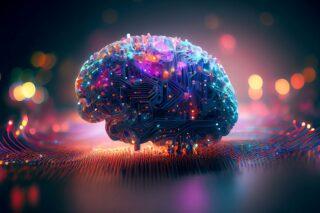Impact of AI on Human Behavior
Strong Emotional Intelligence is vital for success, and the emergence of AI provides a new avenue to boost our abilities.
Artificial Intelligence
Artificial Intelligence (AI) tools are fast emerging as transformative forces to mimic our thinking; they will reshape how we interact, work, and serve customers. This clearly could confront our traditional path to consider our options and make decisions. Given this likelihood, Dr. Ann Polya is examining the complex relationship between AI and human behavior in her forthcoming book “Dance of the Minds: Exploring the AI-Human Cognitive and emotive behavior,” which will delve into the intricate interplay between these three components.

Strategic Emotional Intelligence
Strategic use of Emotional Intelligence is critical to make balanced decisions and we can use both emotional and logical processes to take actions. Indeed strong Emotional Intelligence is vital for our success. It creates a path to be alert to our feelings and thoughts and keep them focused on our goals. This way, we have meaningful connections and choices to communicate effectively and cope successfully with challenges. The great news is that by using our Emotional Intelligence skills strategically, we gain a competitive edge over devices of the future, such as robots and super computers, as they cannot reconcile feelings with rational processing.
How can AI help
It begins with an overview of AI -its chatbots and other tools- and their rapid advance in our society due to their speed, and facility to provide and store vast quantities of data, the ability to learn from mistakes, and be programable to personalize our experiences. One major AI tool is ChatGPT which can create texts -thanks to its algorithms applied to artificial networks that are based on our Brains’ neural networks. Their impact on us all will be significant: – not only will it spur further innovation in smartphones, and virtual assistants such as Alexa and Siri, and improve cybersecurity, but also, impact most industries, including, healthcare, agriculture, car manufacturers, and the legal and educational professions.
The human mind has been doing these data gathering and storing functions in our memory for centuries- unaided by artificial support systems; however, now with AI-based tools mimicking human processes, this raises issues about the repercussions of the interface between AI development and human behavior and the potential influence it will have on our cognitive and emotive responses.
Adding in advances to How are Brains function
We book explores how human behavior operates, and notably our mechanisms to think and feel, which drive our actions. A worst-case scenario is that we are deluded into viewing AI as magic because of its speed and assumed view that it is “perfectly correct,” and thus, simply copying what is generated by AI tools could lead to a decline (from lack of use) in our abilities to think and feel.
However, the situation is not so stark. AI is still in development, and while it does relieve us of much grunt work in crunching numbers and sorting data, it, nonetheless, does require human intellect to oversee and review the results. Plus, AI demonstrably falls short of human creativity, and cannot yet replicate our emotions, and nor can it make decisions based on intangible variables. Hence, human responses will still be required as our brains make the necessary adaptations to the new thinking and feeling requirements.
Finally, the book assesses the future landscape of cognitive and emotive behavior in the age of AI. As this transformative AI technology grows, within the boundaries of potential future constraints, this book explores ways our minds adapt- if necessary- to navigate these changes effectively.
Dr. Ann Polya is a trained psychotherapist and the author of four books. She is also a member of Impact the Palm Beaches.
© Dr Ann Polya- 2024
Artificial Intelligence and Emotional Intelligence
Artificial Intelligence is a game changer. It is not new, but recent developments have vastly expanded its presence in our lives. It generates audio, visual, and written word, and is widely, and increasingly, used by all the big tech companies, as it is fast and can replace and facilitate many human actions.
As a major new player, how will we as humans use these new tools for our benefit?
Emotional Intelligence
In particular, will it challenge our human abilities to think for ourselves, experience our emotions and feeling’s and will out actions be driven by artificial elements -such as robots- or will we still retain control via the use of our own Emotional Intelligence?
What is Artificial Intelligence?
Artificial Intelligence (AI) is fast emerging as transformative force that mimics our thinking. AI and it’s various tools are being created to reshape how we work, interact, and provide services. Tools have already been designed to write journalistic articles and even pass the law exam. Many people just copy out and follow AI suggestions – as if they are necessarily the truth. Yet in reality, AI is still under development, and still learning from it’s plentiful mistakes.
Our judgement about what to accept is still important, but it does introduce a tempting easier path to take when making decisions. So far AI has not replicated human feelings, but has made great advances in providing factual data that gets translated in “thinking”.
Dr. Ann Polya is examining the complex relationship between AI and human behavior in her forthcoming book, which will delve into the intricate interplay between these three components.
Strategic Emotional Intelligence

Strategic use of Emotional Intelligence is critical to make balanced decisions. It uses our emotional and logical processes to take actions. This enables us to take back control over our thinking and our feelings, so that we can direct our actions. Indeed strong Emotional Intelligence is vital for our success.
At present, our own Emotional Intelligence has a competitive edge over robots and other AI tools, as they have not yet managed to factor in the importance of our emotions and feelings into their algorithms.
Influence of AI
Artificial Intelligence is already with us and it will become an even greater force. In Dr Polya’s last book, “Become Better”, she examined how we can control our thinking and feelings, so that we adapt to meet new challenges. This is a new challenge that will require similar human vigilance so that we use it to our advantage.
AI uses numerous tools, such as including ChatGPT, that can create texts, audio and visual material by transposing vast quantities of data by the use of algorithms that mimic our Brains’ neural networks. Its advantages are its speed, storage capacity, ability to gradually amend its programs due to inaccuracies. It is already used in smartphones, and virtual assistants such as Alexa and Siri, and is being more widely used in business.
The human mind has been doing these data gathering and storing functions in our memory for centuries- unaided by artificial support systems. The big unknown is whether, as many proponents, claim whether AI augments human behavior or will it begin to replace our human functions?
Dr. Ann Polya is a trained psychotherapist and the author of four books.
© Dr Ann Polya- 2024
